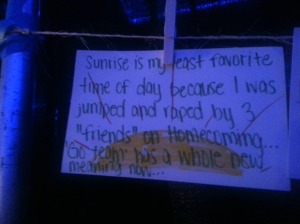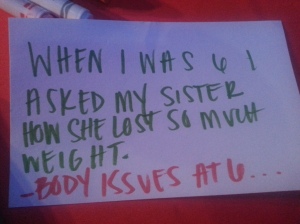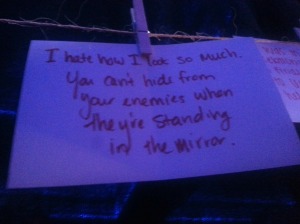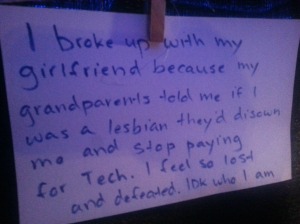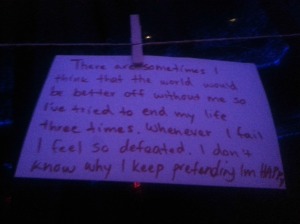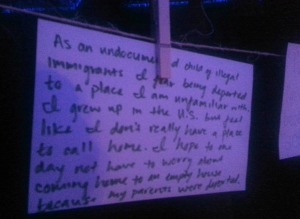There are some days when you come home with a heavy heart.
We’ve all had those long days that leave us dragging. That weight can be added by a long day in the office, a fight with a friend, or a number of other things. For some of us, however, that weight is added a little bit easier.
One of my top Strength’s Finder words is empathy. Although I consider it one of my best strengths, it can also be a little torturous at times. Empathy is “…the feeling that you understand and share another person’s experiences and emotions : the ability to share someone else’s feelings.” For my work in Student Affairs, empathy helps me step out of my own shoes and into those of my students. It’s a wonderful skill that I feel allows me to understand what they are going through and how that effects their development through their education and life. Although this is useful, it has some adverse effects, too.
Sometimes, it hurts. It hurts when I have to have a disciplinary conversation with my students that is hard for them to hear. I know that these conversations could lead to them losing a job or their home in Residence Life. It hurts when I hear about their homesickness and frustrations on test scores. I know that these issue often make our students want to toss away their education. And finally, it hurts when I hear that they are being hurt or mistreated by others. Because in all of these things, I can understand their pain and nearly feel it all myself, but there is often little I can do to alleviate it. My only weapon is education, some campus resources, and a good ear, but those things often do not have the immediate effects I would like them to have.
One such moment that hurts me is when I see my students or friends or anyone else, really, experience oppression. “Institutional Oppression is the systematic mistreatment of people within a social identity group, supported and enforced by the society and its institutions, solely based on the person’s membership in the social identity group.” Seeing those I care about shut in a box by the world because of the color of their skin or their culture or their religion or anything else beyond their control, is probably the most painful experience of them all. It’s only made worse when you think about how many people don’t believe the experience of those in the box is legitimate.
I can tell you it is legitimate.
I can tell you, because I see it day after day, and I feel the pain of my students and colleagues and friends. It permeates my campus. It’s whispered by students who either truly believe their oppressive words or who are parroting things they were taught by elders. It’s felt by students who quietly try to ignore it or laugh it off or boil in their own anger. Whether they experience in person or they see it on the news or they see it on an anonymous YikYak post, oppression isolates and harms people. Like any other form of psychological abuse, the effects are lasting.
I recognize that I have been relatively privileged in my life, but my own experiences as a woman and my empathetic personality have made oppression a topic that I am particularly fiery about. I’m sure most of you that have me on Facebook are pretty tired of my endless social justice posts. Sometimes I feel ashamed at my own voice and the effects it probably has on my relationships. However, the one thing that always makes me return to advocacy is seeing a student or a colleague affected by these issues.
Just like I want to help my students succeed academically, I want them succeed mentally and have the best opportunities. However, with experiences (Swastikas, racist language, and threats abound) like those at Mizzou and Yale not being uncommon, I can understand the fear and anguish of my students and others. What’s worse is that people often think racism is isolated to a couple individuals or doesn’t exist at all. What’s is worse is that, although I have empathy for my students, many do not. It didn’t take too long to scroll down on an article of about Mizzou protest to see grown adults calling the students involved a bunch of overreacting, hate-mongering, animals. Funny enough, it didn’t take long for bomb threats and gun threats to get lobbed at the students of color on campus either.
However, I can tell you that those students are not overreacting. They see something legitimate that we want to close our eyes to.
About a month ago (2015!!) I logged onto my university’s YikYak and saw these:
These weren’t the only ones either. I deleted my YikYak, because I couldn’t stomach any more. I thought it was just one student trolling at first, but then I saw multiple comments by different people and likes on racist jokes.
Let me ask you: What do I tell a African American or Latino student who has seen these posts? How do I tell them they will be safe on our campus?
But we’re in a post racial society, right? Our students are overreacting, right? It’s all in their head? The only thing keeping them from succeeding is themselves, not the overwhelming racism still alive and well in our education system or society. Right?
I can try and educate my students as much as possible with my many wonderful colleagues, but we need more than just us to fix this problem.
We, as a society, have lost empathy. Those YikYaks, the threats to students at Mizzou, the girls kicked out of a “white girls only” fraternity party at Yale…All of it should upset you in 2015. All of it should upset our students and their administrations. All of it should be enough to stop the denial. All of it should make us think of our own experiences and how we wanted to have a best chance at reaching our dreams. All of us should think of how we want our children to be cared for and succeed. Then all of us should think about what it would be like if you or your child saw these hateful and often threatening posts everyday on social media. Would you feel safe at school? Would it hinder you? Would you want to fight back?
These students at these universities are not making up this problem. They are fighting to change something that is wrong within their institutions. They are fighting to heal a wound that psychologically hinders them everyday. So, when you criticize these students, please stop and listen and try to put yourself in their shoes. If they felt heard and understood by their peers and their institutions and their government, you wouldn’t have the protests that so many of you criticize.
But until we hear them and we try to understand and we realize that these problems are real, these protests will continue and education will suffer. So will the world.

















